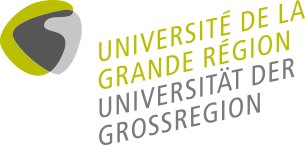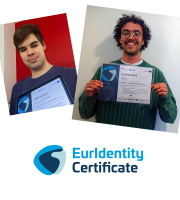
Stand out with the EurIdentity Certificate!
This unique additional qualification is open to all students at UniGR partner universities, no matter their field of study. It offers the opportunity to deepen your understanding of Europe, shape your personal European profile, and strengthen your language and intercultural skills through international experience.
This additional qualification is open to all students at UniGR partner universities, regardless of their field of study. It offers the opportunity to gain diverse knowledge about Europe, sharpen one’s personal European profile, and enhance linguistic and cultural skills abroad.
A real asset for your international career.
Have you already completed the Basic Module (6 ECTS)? Then take the next step with the EurIdentity Advanced Level (18 ECTS) to obtain the full certificate:
Elective courses in various Europe-related fields: European humanities, arts, languages, literature and intercultural studies, European challenges in science and technology, European governance and politics.
International mobility (at least 3 ECTS): an exchange with a UniGR partner university or another European institution – either in person or online.
A big thank you to Felix Dingwell and Felix Heß for their inspiring testimonials!
Find out more at your university or on our website: https://www.uni-gr.eu/en/studying/euridentity-certificate
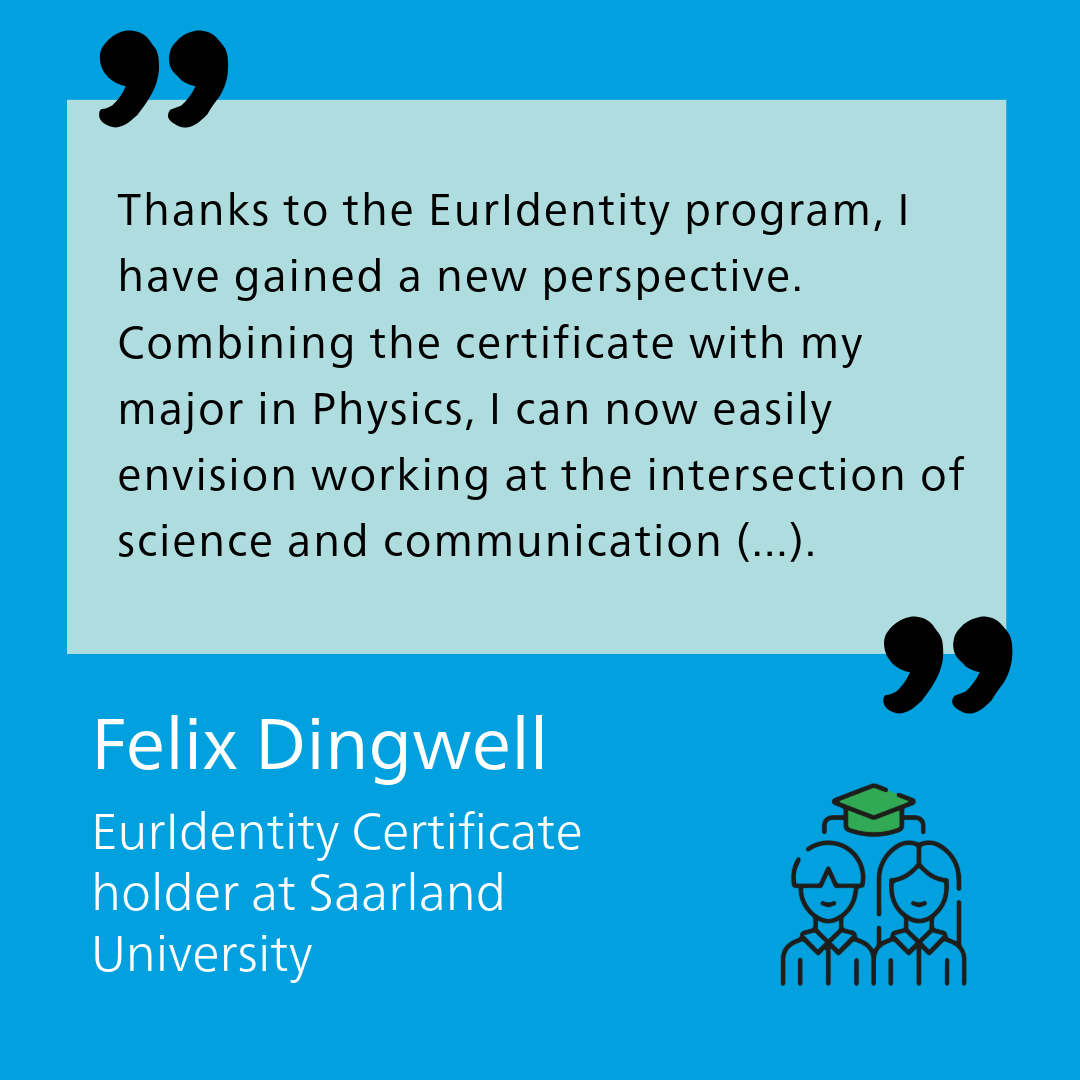
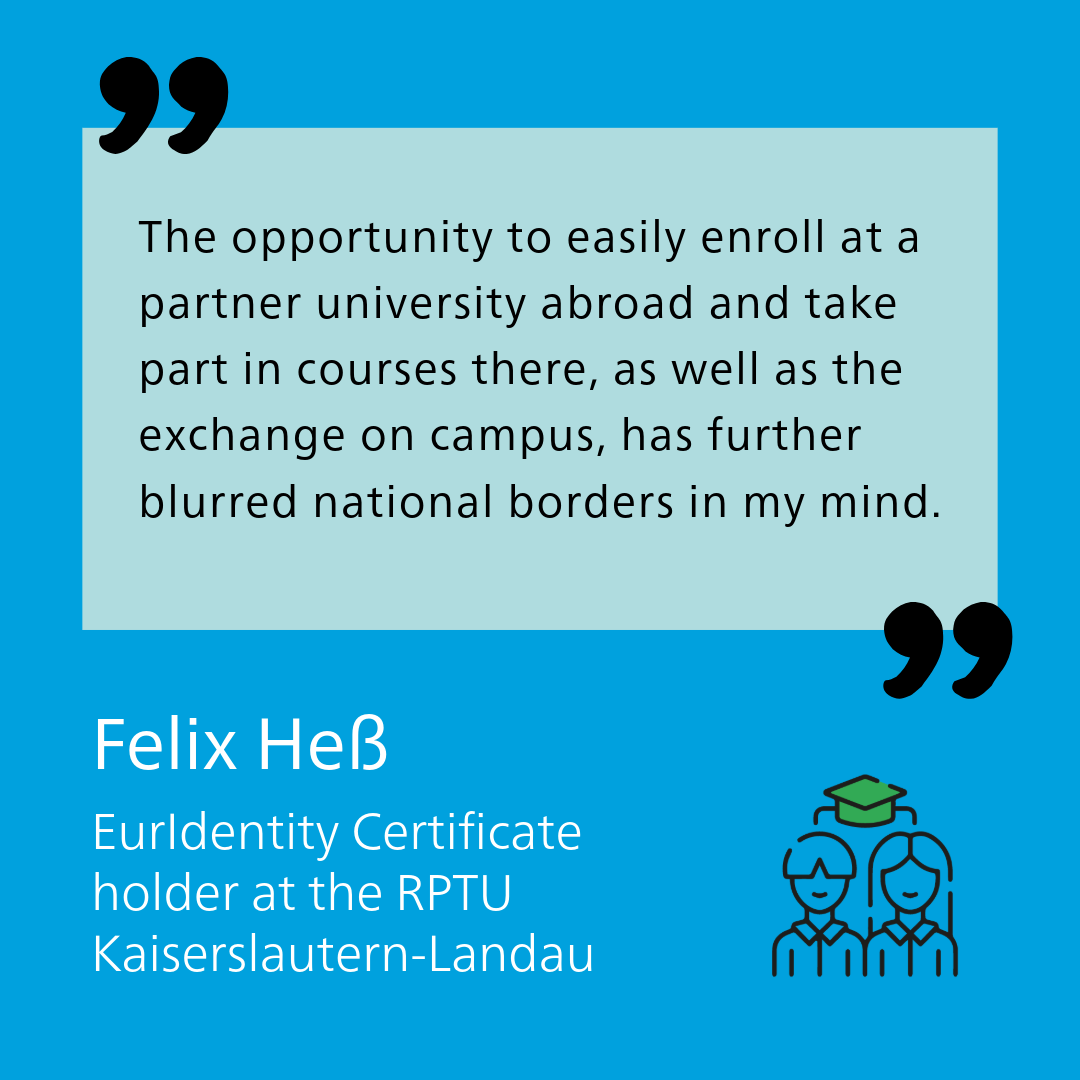
Testimonial Felix Dingwell
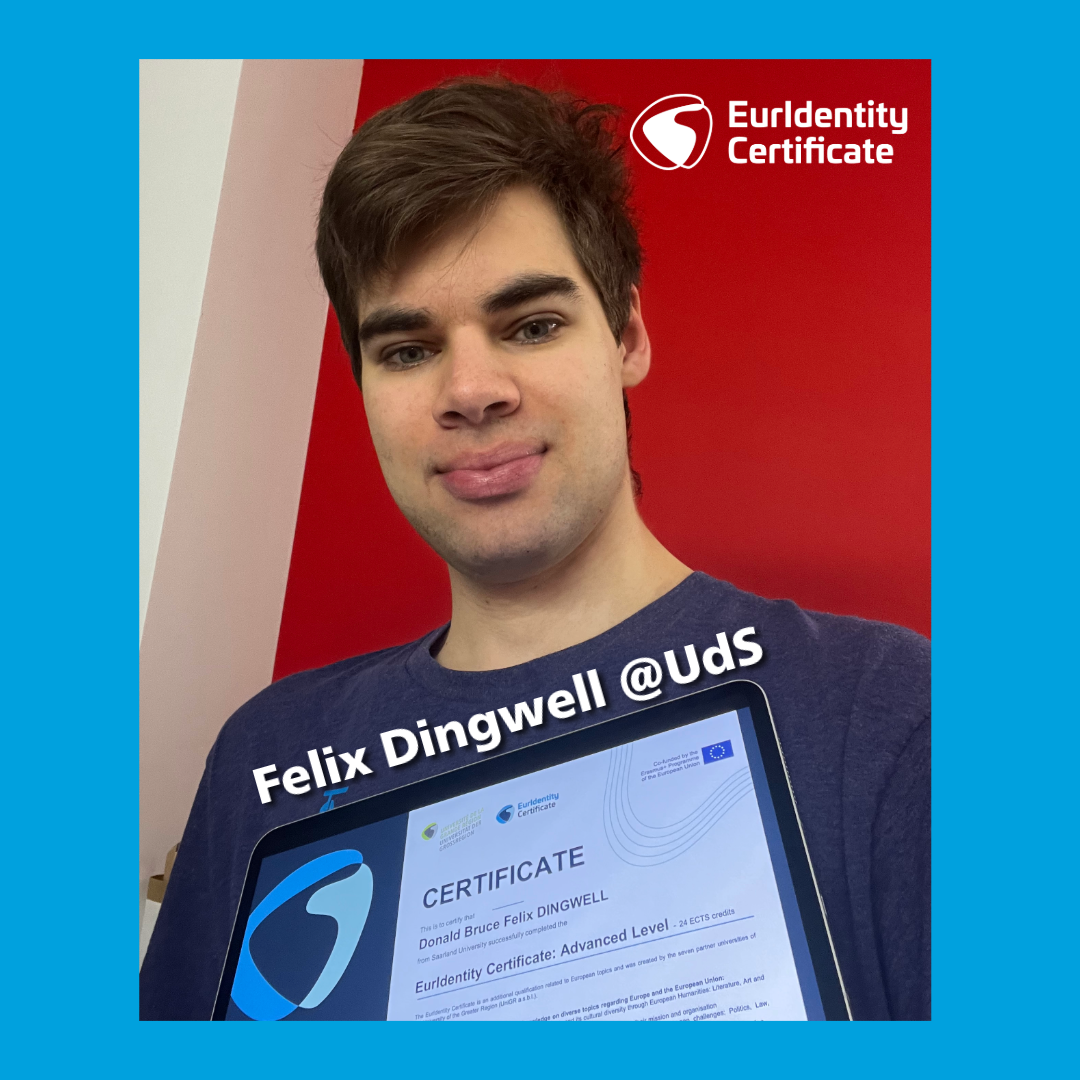
1. Tell us a bit about yourself: where and what do you study?
Hi, my name is Felix. I study International Physics at Saarland University and the University of Lorraine in Nancy.
2. What motivated you to pursue the EurIdentity Certificate?
Since I started my studies in 2020, I have studied at three universities in France, Luxembourg, and Germany. The opportunities for international mobility offered by Erasmus and the Franco-German University showed me that Europe can only work through cooperation. Thanks to Schengen, I was able to cross borders without any difficulties. In Luxembourg, I had the chance to visit the Court of Justice of the European Union. After all these experiences, I wanted to better understand how Europe and the EU function. The EurIdentity Certificate was the perfect choice.
3. The program allows you to freely choose European-related topics. Was there a subject that particularly fascinated you?
As a polyglot, I especially enjoyed a course on cultural diversity and multilingualism in literature. We read and discussed classics as well as lesser-known works. With my fellow students from many different fields, the discussions were always rich and full of diverse perspectives.
4. The first part of the EurIdentity Certificate is an online module taught by instructors from seven different universities. How did you experience this international and interdisciplinary approach?
Bringing together multiple experts from different universities in a single online module gave the program a truly European and international character. It showed me how effective cooperation between institutions can lead to excellent results.
5. Mobility experience is a key pillar of the program. Did you notice any differences between learning cultures?
I was able to have several courses from my international stay recognized as part of my Bachelor’s degree. Studying at a foreign university gave me a genuine international perspective. I can now easily imagine working in France in the future.
6. What were the biggest personal challenges you faced during the program?
For me, the real challenge was moving beyond the very technical and mathematical mindset of physics to engage with the methodologies of the humanities. For example, I had to learn how to analyze artwork in an art history course, which was completely new to me.
7. How has the program influenced your career goals or your outlook on the future?
Thanks to the EurIdentity program, I have broadened my perspective. I no longer see myself working solely in a purely scientific field. By combining the certificate with my main subject, I can now imagine working at the interface between science and communication or in the coordination of technical projects. The program has truly opened up new paths for me.
8. Are there any memorable moments that stand out to you?
Yes, when we recorded a podcast with my classmates as part of the course on cultural diversity in literature. A great memory!
9. The EurIdentity Certificate is a play on words between “European Identity” and “Your Identity.” Has the program helped you develop or strengthen your European identity?
The program has really shaped me. I was already enthusiastic about Europe, but now I better understand the real complexity of the European Union. I recommend this program to all students—regardless of their main field of study.
Testimonial Felix Heß
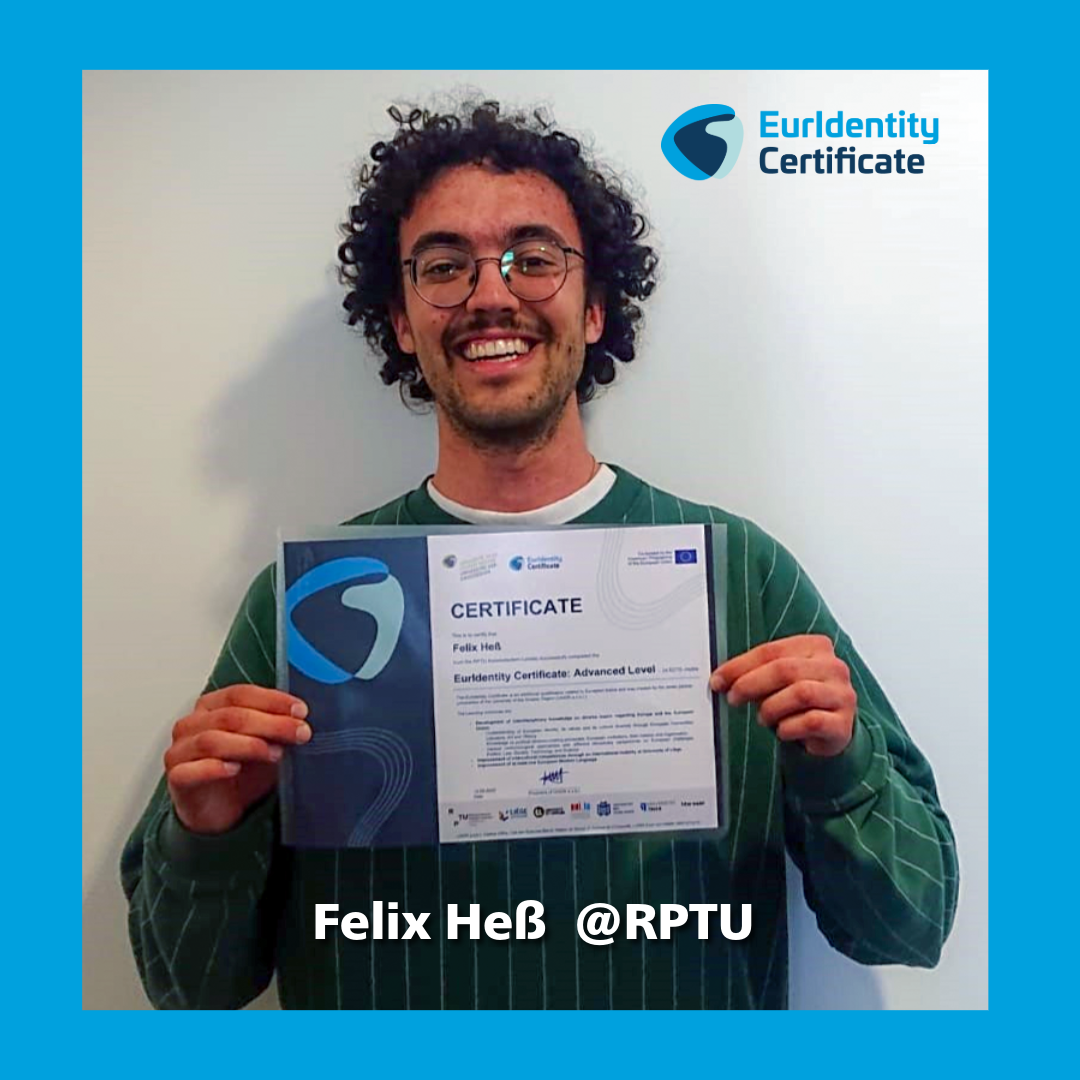
1. Tell us a bit about yourself: where and what do you study?
I study socioinformatics at RPTU on the Kaiserslautern campus and am about to complete my bachelor's degree.
2. What motivated you to pursue the EurIdentity Certificate?
I am passionate about European history, European politics, and the EU. For me, Europe offers the chance to learn from history and to build together a diverse and open society. The current geopolitical situation is an opportunity for us to form a reliable, capable, and democratic community through European cooperation. When I discovered the new EurIdentity Certificate program, I immediately knew I wanted to enroll. This certificate allowed me to study relevant history as well as the current legislative structures and processes of the EU. At the same time, the challenge of taking exams in English in a neighboring EU country motivated me a lot.
3. The program allows you to freely choose European-related topics. Was there a subject that particularly fascinated you?
I am especially interested in European politics and digital policy. In my socioinformatics studies, I have developed a growing awareness of the interactions between technology and society, as well as their positive and negative societal consequences. That is why I have long been interested in legislation concerning social networks and artificial intelligence. To deepen this area, I mainly took courses on European legislation and the organization of the EU as part of the certificate.
4. The first part of the EurIdentity Certificate is an online module taught by instructors from seven different universities. How did you experience this international and interdisciplinary approach?
I especially appreciated the courses offered by professors from the partner universities. They gave me the opportunity to experience different teaching formats from universities in various countries. At the same time, it was a chance to get familiar with courses taught in English alongside my bachelor’s in German and prepare for an international professional environment. I also really enjoyed the interdisciplinarity of the courses: they covered a wide range of topics such as philosophy, history, art, and politics. This allowed me to acquire foundational knowledge in different disciplines and find themes I want to explore further in later courses.
5. Mobility experience is a key pillar of the program. Did you notice any differences between learning cultures?
Due to the considerable distance to Liège, I was unable to attend my two courses in person. It was therefore especially helpful that my seminar was recorded weekly and made available online. I could always watch the courses/seminars and take notes on the materials provided. During these seminars and my in-person written and oral exams, I noticed that teaching in Liège was more on an equal footing: professors and examiners were very approachable, warm, and straightforward. There was always a five-minute coffee break in the middle of the seminar. The examiner for my oral exam was very kind and created a pleasant atmosphere. The exam felt more like a relaxed conversation than a stressful test under pressure. My written exam also had a new format for me: a paper sheet with 20 multiple-choice questions and another sheet to check the corresponding boxes for each question.
6. What were the biggest personal challenges you faced during the program?
Mobility. As I said, I could not attend courses in person. Getting to exams without a car using public transportation was complicated. Since both of my exams were at 9 a.m., it was not feasible to travel from Kaiserslautern to Liège on the same day. I therefore stayed with friends in Aachen for a week. From there, a fast train takes half an hour to reach Liège, which allowed me to be on time for the exams.
7. How has the program influenced your career goals or your outlook on the future?
The EurIdentity program allowed me to build an additional specialization alongside my studies that relates to my student job. Over time, there were synergies: the courses provided useful knowledge for work, and conversely, my job helped me with the certificate courses. I also took on the mobility challenge. Going to another university in another country with another language, without familiar surroundings, and passing exams there boosted my confidence to work internationally and take on challenges in an international context. It also showed me the importance of lifelong learning. Since I was enrolled as a “free student” at Liège, I want to continue training occasionally at the university even when I start working full-time. I am sure all these experiences will be valuable in my future career.
8. Are there any memorable moments that stand out to you?
During my second exam, there was a snowstorm around Liège. No buses were running in the city and regional transport was stopped. I had to walk for two hours through heavy snow to the station and buy an ICE ticket. At the time, it was a bit tough, but in hindsight, it became an experience.
9. The EurIdentity Certificate is a play on words between “European Identity” and “Your Identity.” Has the program helped you develop or strengthen your European identity?
Definitely. The basic module already taught me a lot about Europe’s history and identity. The advanced-level courses showed me more about the importance of European cooperation. I am also very grateful to have been able to study beyond borders thanks to the EurIdentity program. The possibility to simply enroll as a student at a partner university abroad and study there, as well as the exchanges on campus, erased national borders for me. Today, thanks to this program, I feel much more connected to the European community and identity than I did before.


